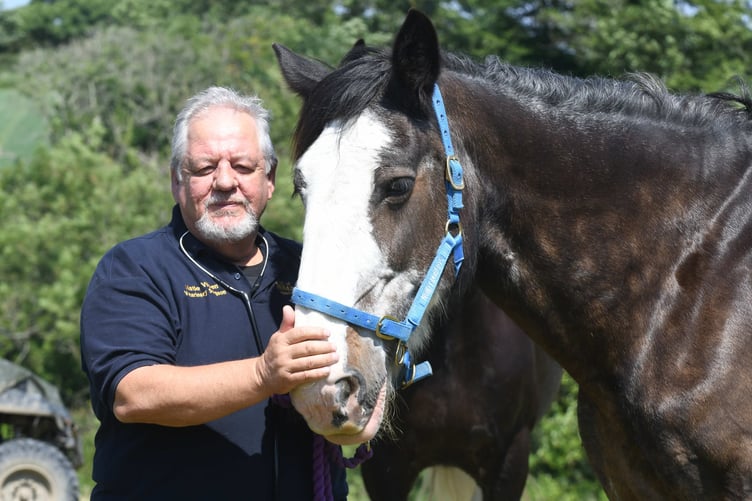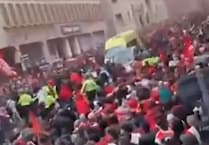For the last 20 years Matie Viljoen has been one of the most respected large animal vets on the island. But twice a year he has also headed off home for a couple of months to his wine farm in South Africa. Now, he and his family are importing some of the wines from his own farm and the surrounding wineries into the Isle of Man.
Matie was brought up on the wine farm which has been in his family for around 100 years. With a degree in veterinary science he also ran a vet practice for 14 years on the farm.
He says: ‘We also had stabling set up for racehorses and we had a good business going. But then, you know, the racehorse industry took a bit of a knock and the wine farm industry took a big knock.
‘The main reason I came over here working was to keep the wine farm in the family, I was forced by financial restraints like world prices at the time.’
And he goes on to explain: ‘Up until 1994, South Africa was subject to economic sanctions and very little South African wine was exported.
‘And then the whole market opened in 1994 and people basically jumped onto the bandwagon and the quality just wasn’t that great.
‘Because it was a novelty in 94, 95 and 96, then the novelty wore off a bit as well.’
So, in 2004, Matie came to work as a vet with Milan practice in the Isle of Man, leaving behind his wife, Dorothea, and their two young sons, Barend and Petrus.
‘My wife was basically running the farm. And raising the kids - behind every good man there’s a very good woman, no question about it,’ says Matie.
His farm is in Worcester in the Breede River Valley which is the biggest wine producing area in South Africa, accounting for nearly 40% of the country’s wine. The valley is 130 kms long and is home to the world’s longest wine route. It consists of a wide variety of different biomes: the western part of the valley being more Mediterranean and the eastern part more arid. The difference in terroir, the French term used to describe the environmental factors that affect a crop’s growth and characteristics, means that the region is suitable for the cultivation of many different cultivars of grapes.
Matie says: ‘Grapes from different parts of the valley will grow, look, smell and taste different and produce different types of wine. When you consider that wine makers use different processes and equipment to produce their wines, it means that each wine in the valley is unique.’
Matie’s own wine farm produces whites, mainly Chenin Blanc, Columbard and some Chardonnay, and a Merlot.
As the years have passed by, Matie has fallen into a routine of going home for several months of the year, usually in February for the harvest and around June for the pruning of the vines.
As you can imagine, his clients and the friends he has made on the island have been quite intrigued by his story over the years and many of them have asked whether Matie’s wine are available to buy here.
Matie says: ‘We have always concluded that there is a lack of quality and continuity in the supply of South African wine to the Isle of Man: there is an untapped market with lots of potential growth.
‘The online wine retailers, restaurants, hotels and golf clubs on the island have a very small selection of South African wines available. The reason for this is because almost all businesses on the island purchase their wines from wholesalers in the UK. The wholesalers only stock a select few South African wines which in turn means that many of the wine sellers on the island end up stocking the same wines.’
But this is about to change.
Matie and his family have set up a company which will import their own, award-winning wines, and those from some of the other producers in the Breede Valley.
Matie says: ‘There are more than 85 wineries in the valley, producing more than 2,000 different wines, so it’s a big old treasure trove to go and look into, and we will be able to choose the best wines from each harvest from this selection.’
The name of the company, Lekka Valley Wines come from the Afrikaans slang word ‘lekka’ meaning enjoyment and they will be sold online.
Barend, Matie’s eldest son who has degrees in law and IT, and has come to live here and has been setting up the website, while Petrus is managing the wine farm and sourcing wines for the company to sell. He is also looking at ways to make their farming methods more environmentally sustainable.
Matie remembers helping out on the wine farm when he was growing up.
He says: ‘At that stage everything was still done by hand. You would fill your basket, and it was all wicker baskets at that stage. Our job as kids was to stand on the wagon and take the baskets on and tip it in to the containers.
‘But it was just, for me, the workers who were just unbelievable: how they could [work so long] because it’s the middle of summer. They start in the morning and they will harvest and they will normally be working together, husband and wife. And, between them, they will harvest a tonne that day.’
Nowadays, Matie adds, the picking is mostly mechanised: ‘But for the top quality wines, the guys still prefer to hand pick because, with the harvester machines, you sometimes crush the grapes.
Nowadays he says, the work on the farm is a great relaxation after the demands of working as one of a very small number of equine and large animal vets in the island: ‘It’s like a holiday going back: you’re sitting on a tractor but you’re able to switch off. And that’s probably the only reason why I’m able to do work like I do when I’m here.’
Matie adds that the name ‘Lekka’ is key because, for them, it is all about enjoyment: ‘That’s what we want to try and bring back because the most important thing is, we are not wine connoisseurs, we are wine farmers that enjoy wine. I say to people: “I’m not a wine connoisseur and I’m not going to tell you this wine is the best”. People need to make up their own minds.’
And now we are about to get the chance to do just that.


.jpeg?width=209&height=140&crop=209:145,smart&quality=75)
-(2).jpeg?width=209&height=140&crop=209:145,smart&quality=75)

Comments
This article has no comments yet. Be the first to leave a comment.